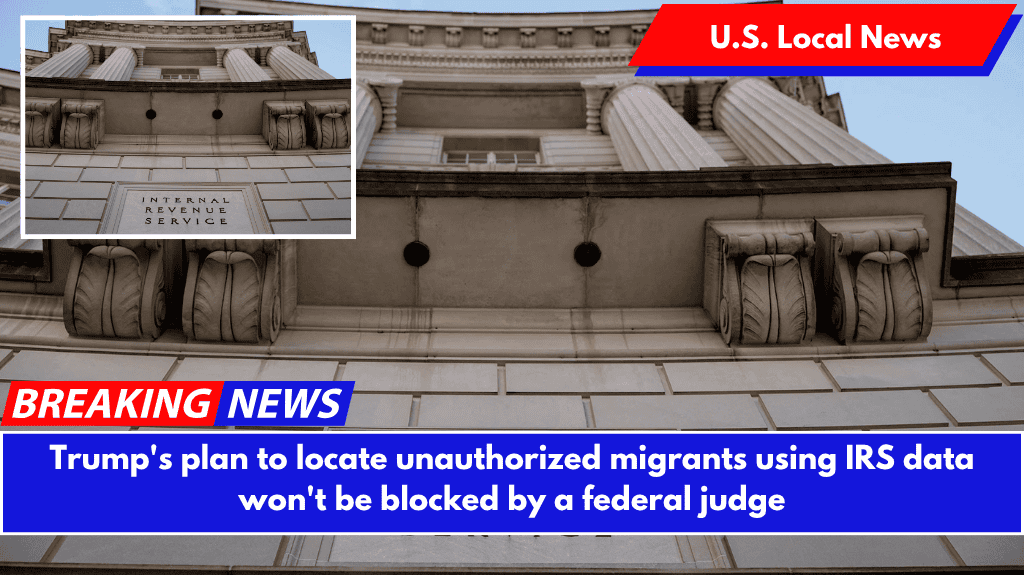A federal judge won’t block a controversial Trump administration initiative to share highly sensitive taxpayer information with federal immigration authorities in hopes of tracking down undocumented immigrants and quickly deporting them out of the country.
District Judge Dabney Friedrich rejected immigrant-rights groups’ claims that the data-sharing agreement between the Internal Revenue Service and Immigration and Customs Enforcement violated taxpayer confidentiality laws.
The decision is a victory for President Donald Trump’s immigration policies. Trump administration officials argued that increased cooperation between the IRS and ICE will protect Americans by removing potentially dangerous immigrants who entered the country illegally.
CNN has sought comment from the IRS and the Department of Homeland Security.
Trump appointed Friedrich in 2017, during his first term. The immigrant-rights groups that filed the case can now appeal her decision to the DC Circuit Court of Appeals.
The data-sharing agreement allows the Department of Homeland Security, which oversees ICE, to request that the IRS confirm the home addresses of suspected undocumented immigrants who are defying deportation orders. Several top IRS officials refused to sign the deal due to legal concerns, but it was ultimately approved in early April.
These concerns stemmed from the fact that federal laws strictly limit the IRS’s ability to share taxpayer information with other agencies. The IRS can share data to aid criminal investigations, but it cannot share data solely to facilitate deportations, which are considered civil matters.
The judge concluded in her Monday ruling that the Trump administration carefully crafted the data-sharing agreement so that it appeared to comply with the law.
The Justice Department has claimed that requests for private data will only target people under criminal investigation for illegally defying deportation orders. Immigrant groups argue that this is a thinly veiled pretext for circumventing the law.
“Requesting and receiving information for civil enforcement purposes would constitute a cognizable injury, but none of the organizations have established that such an injury is imminent,” Friedrich wrote.
He continued: “The Memorandum only permits sharing information for criminal investigations.” On this limited record, the Court cannot conclude that DHS intends to use the shared information to facilitate civil rather than criminal proceedings.
Alan Morrison, an attorney for the groups that sued the Trump administration, expressed disappointment with the ruling but is considering an appeal and additional litigation.
The judge “made it clear that DHS and IRS must strictly comply with the limited exception on which they relied,” Morrison said in a statement. “So far, DHS has not made formal requests for taxpayer data, and plaintiffs will be keeping a close watch to be sure that the defendants carry out their promises to follow the law and not use the exception for unlawful purposes.”
For decades, undocumented immigrants have been encouraged to register with the IRS and pay their federal taxes, with assurances that their private identifying information will be kept private.
The Trump administration’s attempt to eliminate the firewall has caused panic among immigrant communities, prompting some undocumented migrants to refrain from filing federal taxes this year.
According to CNN, Elon Musk’s Department of Government Efficiency is creating a master database with data from IRS, Social Security Administration, and other agencies to improve immigration enforcement.
A spokesperson for the Treasury Department, which oversees the IRS, insisted late last month that taxpayer information is not “being inappropriately shared across government agencies.”
Friedrich questioned the legality of the Trump administration’s data-sharing agreement during a court hearing last month. She also pressed the immigrant-rights groups that filed the case, asking them to provide evidence that the Trump administration intended to violate taxpayer privacy laws.
“At its core, this case raises a narrow legal question: does the Memorandum of Understanding between the IRS and DHS violate the Internal Revenue Code? “It does not,” Friedrich wrote in her decision Monday. “The plain language of (the federal tax code) mandates disclosure under the specific circumstances and preconditions outlined in the (IRS-ICE agreement).”











